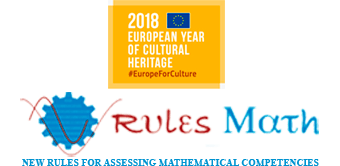Current Status of Methodology of Teaching and Assessment of Mathematics at partner’s universities
The purpose of these reports is to present the results of the analysis of the current status of the training methodology that we use and the criteria for evaluating the mathematical knowledge and competences acquired by students at partner’s universities. First-year students are considered for these reports, in accordance with the objectives of the present project. Also, on the basis of this analysis, conclusions and proposals for the formulation of new efficient methods and standards for knowledge and competence assessment will be made.
Examples are given with the current system for teaching and assessing knowledge for several selected courses.
Study about early educational stages in partner’s countries.
The purpose of these reports in to have a clear idea about what is already done about competencies assessment in low educational levels and also in other disciplines different from mathematics.
Competencies-based assessment in early educational stages:
User guides
These documents were thought as guides for professors, lectures or tutors who want to implement the competencies-based assessment with their students.
To use a competencies-based methodology, it is necessary to change the usual way of teaching and learning. Students must improve their knowledge taking an active role in classes.
What is shown in these guides is an example of an evaluation activity.
The report: “A Framework for Mathematics Curricula in Engineering Education” (by Alpers, et al., 2013) provides a European framework for teaching Mathematics in engineering degrees. That document has a part which contains rather specific, fine-grained specification of potential content-oriented learning outcomes (LO). Its intended usage is that lecturers and/or curriculum designers develop from it a concrete curriculum for a specific study course.
Once the LO list has been developed with specific activities, there is a development process in which the student acquires the competencies that are enumerated through activities marked by the teacher in different scenarios: the classroom, laboratory practices, small projects, search for information on the network, etc. Through these regulated activities or not, the student acquires some knowledge and skills that we try to evaluate with the example that is proposed. That is to say, in short, this proposal tries to measure if the student has acquired the knowledge and competencies for his activity prior to the evaluation process.
In this Framework document, all mathematical competencies are included:
- Thinking mathematically.
- Reasoning mathematically.
- Posing and solving mathematical problems.
- Modelling mathematically.
- Representing mathematical entities.
- Handling mathematical symbols and formalism.
- Communicating in, with, and about Mathematics.
- Making use of aids and tools for mathematical activity.
We have also included the objectives, contents, learning outcomes from the Core Level 1, and a possible exam for some specified LO. This exam could be used as a small project (miniproject) that can be worked either in groups or individually or both options: start working individually and then share and discuss the results in a group.
Assessment standars defined during this project for assessing mathematical competencies are the following:
- Multiple-Choice Questions.
- Questions or «classical» problems.
- Projects.
All together make up the way to assess competences. One of them is not enough, but the three of them make the best option.
These user guides and separated files for each discipline are available at the moodle platform of the project (https://studium.usal.es/) and also included in the book of the project:
«New Rules for Assessing Mathematical Competencies: USER GUIDE»
Snezhana Gocheva-Ilieva and Araceli Queiruga-Dios Editors
© Paisii Hilendarski University Publishing House
ISBN: 978-619-202-575-5

